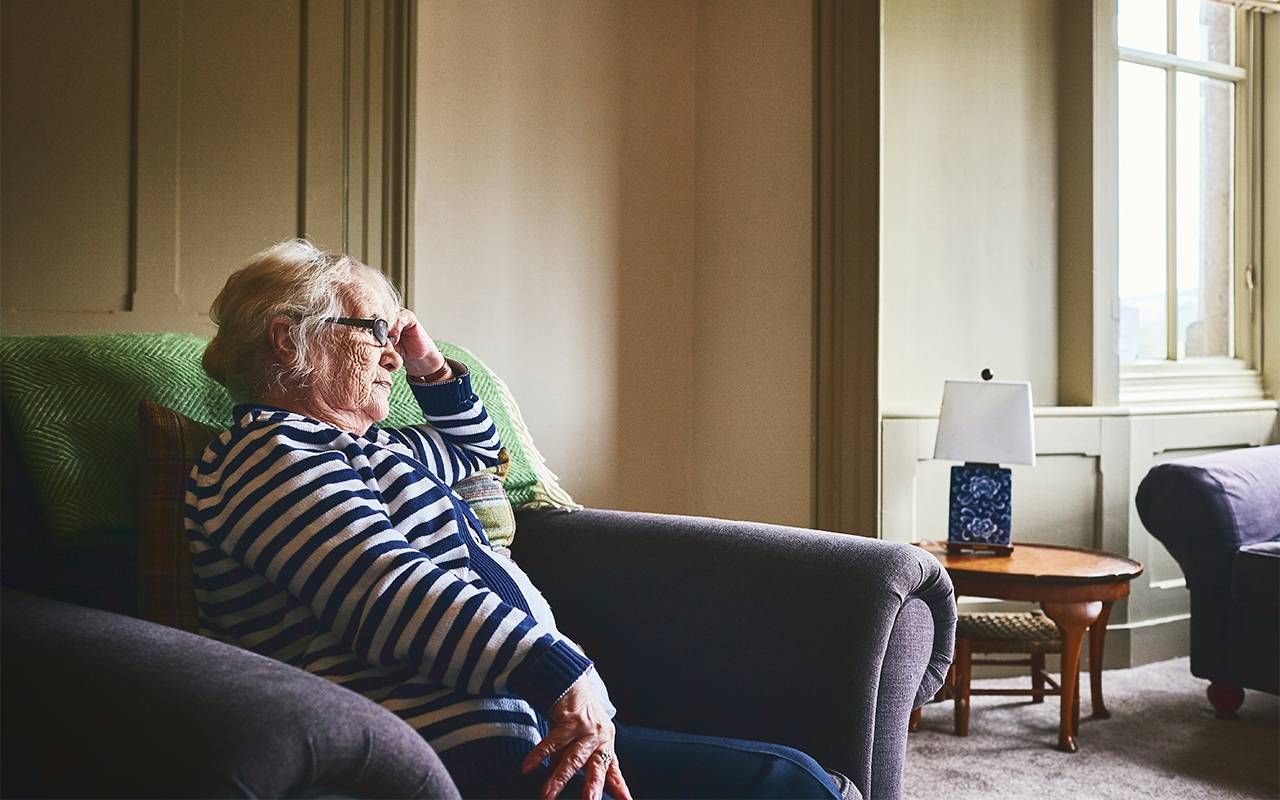Neuropsychiatric Aftereffects of Long COVID
Long COVID is still a relatively new phenomenon, and researchers and clinicians are working to fully understand the contributing factors to neuropsychiatric outcomes
The pandemic that shook our world is no longer a national public health emergency. People are back in the office, boarding planes for long-delayed vacations, eating and dancing at large wedding receptions. But for many who contracted COVID-19, even a mild form of it, there are harsh reminders of long-lasting reverberations.

A report released in January 2023 by the Substance Abuse and Mental Health Administration (SAMSA) showed that an estimated 30% of people who had the virus developed long COVID, also known as post-acute sequelae of COVID-19 (PASC), with more than half experiencing cognitive, neurological or psychiatric problems.
Horath recently applied for long-term disability after a whole year of hoping that he would be able to return to his job.
Thomas Horath, age 50, of Maspeth, New York, knows about this. In May 2022, Horath felt a weird sensation, as if a curtain was falling over him, and he tested positive for COVID. Eighteen days later, after beginning to feel better, he woke up and realized he was paralyzed on his left side. The doctors ruled out a stroke at the hospital, gave him IV fluids and sent him home.
Two days later, it was his left side. And three days after that, a racing heart, difficulty breathing and various terrifying other symptoms sent him back to the hospital, where he has been numerous times since. Formerly a relatively healthy pharmacy tech, Horath was now a bona fide entrant into the world of long COVID.
Unable to work because of profound fatigue, cognitive difficulties, a dysfunctional autonomic nervous system that sends his blood pressure soaring, painful burning in his forearms and other neuropathies, Horath recently applied for long-term disability after a whole year of hoping that he would be able to return to his job.
At a post-COVID clinic, Horath sees a variety of health care providers, including a critical care physician (who functions as his primary doctor), a neurologist, a cardiologist, an infectious disease specialist who has treated him for repeated bacterial infections, a pulmonologist and a psychiatrist among others.
Horath and his husband used to lead an active life – going to baseball games and Broadway theater, caring for feral cats in his neighborhood and traveling.
Horath says, "I sometimes sleep 12 or 13 hours a day and can still barely get out of bed." The neuropathies are the worst physical pain he experiences, but the emotional pain is sometimes almost unbearable.
An estimated 30% of people who had the virus developed Long COVID, with more than half experiencing neurological or psychiatric problems.
Choking up, he explains, "I was never depressed or anxious in my life before COVID, and now I get so frustrated by my lack of progress. My doctors say I have one of the worst cases of long COVID they've seen. I get terrified that this is my life and that things will never get better."
On May 16, the American Academy of Physical Medicine and Rehabilitation released a Consensus Guidance Statement for Diagnosing and Treating Common Symptoms of Neurological Complications from long COVID.
According to Leslie Rydberg, MD, a physiatrist, Associate Professor of Physical Medicine and Rehabilitation at Northwestern University Feinberg School of Medicine, and co-author of the Guidance Statement, "Neurologic sequelae are very common in long COVID."
Rydberg continued, "The most common neurocognitive symptoms include headache, muscular and nerve pain, tremors, peripheral nerve issues (neuropathies with tingling or burning sensations), weakness, cognitive and sleep issues." These usually do not exist in isolation but are seen in symptom clusters affecting multiple organ systems.
One study involving 78,252 patients demonstrated that 75.8% of patients with post-COVID symptoms experienced initial mild symptoms not requiring hospitalization.
Involvement of the cranial nerves, which control vision, hearing, smell, taste, balance and other nerve functions, is also common. Other symptoms may include vertigo, bowel or bladder problems, or syncope (a medical term for fainting).
Neuropsychiatric symptoms of long COVID include depression, anxiety, sleep disturbances, irritability and Post-Traumatic Stress Disorder (PTSD). Psychosis is a relatively rare complication.
The gravity of PASC symptoms does not always correlate with the severity of the acute illness. One study involving 78,252 patients demonstrated that 75.8% of patients with post-COVID symptoms experienced initial mild symptoms not requiring hospitalization.
What Causes Neuropsychiatric Issues?
There are several theories regarding the ubiquity of neurologic symptoms in long COVID. One hypothesis is that the COVID virus invades the brain via the olfactory nerve, inducing neuroinflammation and damage to the central nervous system (brain and spinal cord).
Inflammation of the cerebral blood vessels can destroy the blood-brain barrier, leading to organic changes in brain cells and reduced metabolic activity. Another theory is that systemic immune dysfunction might cause a "cytokine storm," which triggers vascular inflammation, increasing the risk of thrombosis and microscopic blood clots.
Ischemia decreases blood supply to the brain leading to low oxygen levels and may cause tissue damage. Altered connectivity in brain networks may be yet another culprit.
A study led by the University of Maryland School of Medicine, which examined MRI results of patients diagnosed with COVID an average of seven months previously, found decreased activity in certain areas of the brain normally used for memory tasks but increased compensatory activity in other regions.
Understanding the Symptoms
While some individuals develop concentration, mood or psychiatric problems immediately after their bout with COVID, some neurocognitive deficits may not emerge until as long as two years after the acute illness.
In search of symptom relief, some long-haulers have turned to alternative healing modalities, such as acupuncture, supplements, IV infusions and dietary modifications.
In his recently published book, "Clearing the Fog, From Surviving to Thriving with Long Covid – a Practical Guide," neuropsychologist James C. Jackson, professor of Medicine and Psychiatry and the Director of Behavioral Health at the ICU Recovery Center at Vanderbilt University, discusses "brain fog," a lack of mental clarity which manifests itself by confusion, difficulties with concentration and mental fatigue.
Key domains of cognitive function, all of which can be impacted, include attention, executive functioning, language, memory, perceptual-motor function and social cognition. Executive functioning includes planning, decision-making, mental flexibility, working memory and cognitive processing. Difficulties with these tasks can impact driving, handling financial matters, judgment and accomplishing goals.
Help for Neuropsychiatric Symptoms
Neuroplasticity, which allows for recovery after damage, is one of the human brain's main features. Cognitive rehabilitation, done by neuropsychologists, speech, and language pathologists, or occupational therapists, offers help for cognitive impairment, focusing on developing individualized techniques, metacognitive strategies and tools that can be integrated into daily life.
Restorative "brain training" activities, such as word or number games, learning an instrument, or using a program such as BrainHQ, can be helpful. Eye Movement Desensitization and Reprocessing Therapy (EMDR), Cognitive Behavioral Therapy, and psychodynamic or supportive therapy can benefit anxiety, depression and PTSD.
Rydberg says, "Sleep disturbances are one of the most common symptoms we see, and poor sleep can worsen everything. Using behavioral strategies to help people struggling with non-restorative sleep is an important part of long COVID management."
In search of symptom relief, some long-haulers have turned to alternative healing modalities, such as acupuncture, chiropractic manipulation, supplements, IV infusions and dietary modifications. Horath has found applications of cold help as does humming, a technique found to relax the nervous system. "I will try whatever I can to feel better," he says.
Long COVID is still a relatively new phenomenon, and researchers and clinicians must fully understand all the contributory factors.
"This is frustrating for us and for our patients," says Rydberg. "Still, our goal is to give back function and quality of life by listening, trying to understand and doing the best we can with what tools we have."


